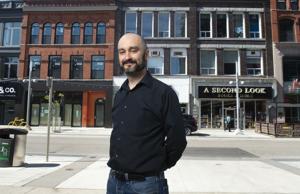Walking around Kitchener’s burgeoning downtown six years ago — a world of tower cranes and excavators, glistening skyscrapers and futuristic light rail — David Marskell, the CEO of Kitchener’s TheMuseum, was brimming with optimism. “Kitchener is past the tipping point,” he declared after the city’s temperamental core struggled for years to reinvent itself. “With the condos, tech companies, LRT and (TheMuseum’s proposed) expansion, the future will rock!” Walking this same downtown route on a rainy June afternoon two weeks ago, with barely a person or vehicle in sight, Marskell’s mood has turned as sour as the weather.
“Oh my God, downtown is the worst it’s ever been in terms of vacancies!” he notes, waving his hand over a sea of boarded up windows. “I’ve never seen this many empty storefronts. Young people are at home on the couch — 50 per cent work there.

The restaurants are closing one a month.” The result: almost a million square feet of office space — about 24 per cent — vacant in downtown Kitchener, says the city’s business development manager, Brian Bennett, compared to 18 per cent in pre-pandemic 2019. Even more telling, a third are designated as Class A, normally in demand properties with top amenities, high income tenants and low vacancy rates.
“There are no pedestrians in the pedestrian zone,” points out Zeljko Loncar, owner of 271 West, the Charles Street restaurant surrounded by a blocked off streetscape that, combined .
















